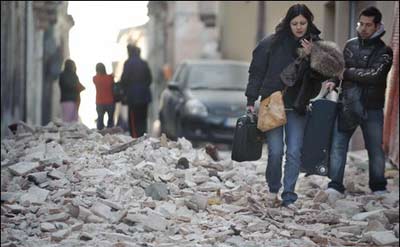|
 The 6.3-magnitude earthquake that took place in Italy on April 6, 2009 killed 308 people in and around L'Aquila, which was largely reduced to rubble. |
|
Seven scientists and other experts were indicted on manslaughter charges Wednesday for allegedly failing to sufficiently warn residents before a devastating earthquake that killed more than 300 people in central Italy in 2009. Defence lawyers condemned the charges, saying it's impossible to predict earthquakes. Seismologists have long concurred, saying the technology doesn't exist to predict a quake and that no major temblor has ever been foretold. Judge Giuseppe Romano Gargarella ordered the members of the national government's Great Risks commission, which evaluates potential for natural disasters, to go on trial in L'Aquila on Sept. 20. Italian media quoted the judge as saying the defendants "gave inexact, incomplete and contradictory information" about whether smaller tremors felt by L'Aquila residents in the six months before the April 6, 2009 quake should have constituted grounds for a quake warning. Specifically, prosecutors focused on a memo issued after a March 31, 2009 meeting of the Great Risks commission which was called because of mounting concerns about the months of seismic activity in the region. According to the commission's memo — issued one week before the big quake — the experts concluded that it was "improbable" that there would be a major quake though it added that one couldn't be excluded. Afterward, members of the commission gave reassuring interviews to local media stressing the impossibility of predicting quakes and that even six months worth of low-magnitude temblors was not unusual in the highly seismic region and didn't mean a big one was coming. In one now-infamous interview included in the prosecutors' case, commission member Bernardo De Bernardis of the national civil protection department responded to a question about whether residents should just sit back and relax with a glass of wine. "Absolutely, absolutely a Montepulciano doc," he responded, referring to a high-end red. "This seems important." Such a reassuring verdict by commission members "persuaded the victims to stay at home," La Repubblica newspaper quoted the indictment as saying. The 6.3-magnitude quake killed 308 people in and around the medieval town, which was largely reduced to rubble. Thousands of survivors lived in tent camps or temporary housing for months. (Read by Nelly Min. Nelly Min is a journalist at the China Daily Website.) (Agencies) |
周三,意大利7名科学家、专家因2009年未能向居民发出地震警报而被控过失杀人罪。那场强震导致意大利中部300多人丧生。 科学家们的辩护律师谴责这一指控说,预测地震是根本无法做到的。长时间以来地震学家们一致认为,以目前的科学技术,还不能预测地震,而且人类从未准确预知过任何一次大地震。 法官约瑟佩•罗曼诺•加格瑞勒命令意大利政府的高风险委员会成员于9月20日在拉奎拉接受审判。该委员会负责评估发生自然灾害的可能性。 意大利媒体援引法官的话说,被告们对于拉奎拉居民在2009年4月6日的强震发生前6个月期间感到的小地震是否预示着大地震的到来“传达了不准确、不完整、不一致的信息”。 检察官还呈上了2009年3月31日高风险委员会召开会议后发布的备忘录。这次会议就是因为连月来该地区地震活动频繁引发民众担忧而召开的。 在该委员会于大地震一周前发布的这一备忘录中,这些专家得出结论说,“不大可能”发生大地震,不过备忘录还说,也不能完全排除发生大地震的可能性。 随后,委员会成员在面向当地媒体的访谈中强调,预测地震是不可能的,尽管六个月来多次发生小地震,但在这种地震多发区并不算反常,也不意味着即将发生一场大地震,让民众放宽心。 在检察官作为呈堂证供的一段访谈中,委员会成员、国民保卫部的伯纳多•德•贝纳蒂斯对于居民是否应该喝杯红酒放松一下的问题做出了应答。这段访谈现在已变得臭名昭著。 他回答说:“当然,当然要喝一杯卓林普乐怡诺红葡萄酒。这似乎还满重要的。”他指的是一种高档的红葡萄酒。 《共和报》援引起诉书中的话说,委员会成员的这一宽慰人心的结论“说服受害者待在家中”。 这场6.3级地震导致这座中世纪城镇内外308人丧生,城内大部分地区都成了一片废墟。数千名幸存者连续几个月都住在帐篷或临时房屋里。 相关阅读 (中国日报网英语点津 陈丹妮 编辑:冯明惠) |
|
Vocabulary: seismologist: 地震学家 temblor: <美> 地震 prosecutor: a public official who charges somebody officially with a crime and prosecutes them in a court of law(公诉人;检察官) memo: an official note from one person to another in the same organization(备忘录) seismic: connected with or caused by earthquakes(地震的;地震引起的) reassuring: making you feel less worried or uncertain about something(令人感到宽慰的;令人放心的) sit back: to sit on something, usually a chair, in a relaxed position(舒舒服服地坐好;放松) verdict: a decision that you make or an opinion that you give about something, after you have tested it or considered it carefully (经过检验或认真考虑后的)决定,结论,意见 |
